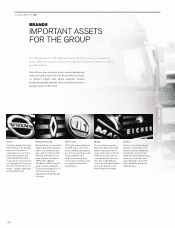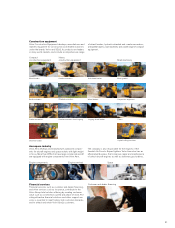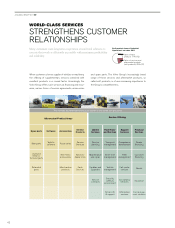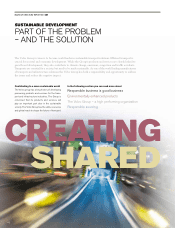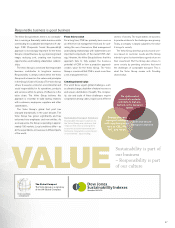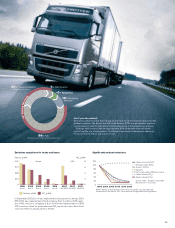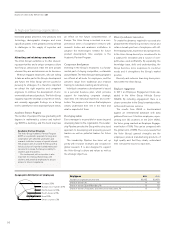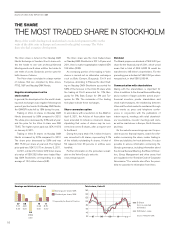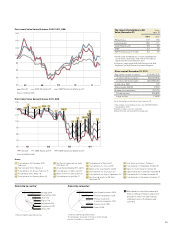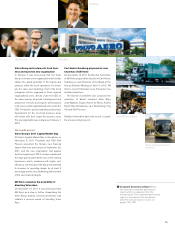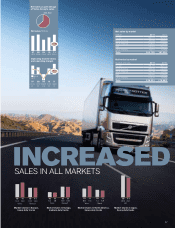Volvo 2011 Annual Report Download - page 52
Download and view the complete annual report
Please find page 52 of the 2011 Volvo annual report below. You can navigate through the pages in the report by either clicking on the pages listed below, or by using the keyword search tool below to find specific information within the annual report.
BOARD OF DIRECTORS’ REPORT 2011
Climate change is one of the greatest chal-
lenges faced by mankind. Research shows that
transport is responsible for approximately 13%
of the total greenhouse gas emissions caused
by humans. As one of the world’s largest manu-
facturer of commercial vehicles the Volvo Group
has a responsibility to work to reduce CO2 emis-
sions from its products.
The Group’s vision is to become world leader in
sustainable transport solutions.
It is critical for the Volvo Group’s future success
to continue to develop breakthrough innovations
and technologies and converting them into finan-
cially viable products and services. The Volvo
Group’s products and services are important
components of the transport system. However,
the transport system sets the boundaries for our
products. The Group therefore has to cooperate
and partner with other actors in order to develop
sustainable transport solutions.
Three areas of focus
The Group’s product development is affected by
the cost of, access to and availability of fuel, as
well as legislation in the environmental area.
Therefore, the Volvo Group focuses its research
and development on the development of:
• Energy-efficient drivelines
• Hybrid drivelines
• Vehicles that can be operated on renewable
fuels.
The Volvo Group also participates in public and
private partnerships to develop sustainable and
efficient transport systems such as Bus Rapid
Transport System (BRT) and Intelligent Trans-
port Solutions (ITS).
Energy efficient drivelines
Approximately 90% of the environmental impact
results from the use of the products. The Group’s
main focus is therefore on reducing the environ-
mental impact of products in use.
The Volvo Group estimates the fuel-saving
potential for a standard truck will be 15% in
2020 compared with fuel consumption in 2005.
New technology can lead to even more significant
savings. For instance, the use of a hybrid drive-
line may improve fuel savings by up to 37% in
certain bus operations.
The Volvo Group is working on research and
development to meet the future Euro VI legislation,
which will come into effect in the EU in 2014.
Emissions of NOx (Nitrogen Oxides), and PM
(Particulate Matter) will be reduced by 97%
compared to a truck from the early 1990s. Vehi-
cles compliant with the Euro VI will thereby emitt
very low levels of NOx and PM.
Hybrid technology
Hybrid technology is one of the most promising
and competitive technologies for commercial
vehicles. Because of its potential for saving fuel,
hybrid technology means lower operating costs
for customers while at the same time signifi-
cantly reducing environmental impact.
Hybrid technology is best suited to urban
operations since the most appropriate vehicles
for hybrid drivelines are those operating in con-
tinuous stop-go conditions, such as city buses
and refuse or distribution trucks.
The Volvo Group’s I-SAM concept consists of
an electric motor and a diesel engine working in
parallel, whereby each of them can be used
where they are most effective. Production of the
Volvo Hybrid city bus and the Volvo Hybrid double-
decker started in 2010. Significant fuel savings
of up to 37% makes this bus a commercially
viable option.
In 2011 Volvo Trucks commenced sales of
hybrid trucks, under the name Volvo FE Hybrid,
to customers in selected European markets.
Tests show that the fuel saving potential for this
truck is up to 20%.
Renewable and alternative fuels
Carbon dioxide neutral vehicles are powered by
fuel produced from renewable raw materials such
as biomass. Reducing dependency on fossil fuels
such as oil, coal and natural gas by increasing the
use of renewable fuels makes business and envi-
ronmental sense. The Volvo Group’s research on
renewable fuels is mainly focused on Methane
Diesel and DME (dimethyl ether).
Joint DME project
DME is a potential alternative to fossil fuel; it is
energy-efficient and has a proven lower environ-
mental impact. Estimates show that by replacing
conventional diesel with Bio-DME carbon dioxide
emissions will be cut by 95%.
The BioDME project is a joint venture with,
among others, the EU and the Swedish Energy
Agency. The aim is to involve the entire chain;
from production of DME from biomass, distribu-
tion to DME used as vehicle fuel.
The Volvo Group is coordinating the project
and develops demonstration vehicles for field
tests between 2010 and 2012. Two vehicles
were handed over to customers for field tests in
early 2011.
Combining methane and diesel
The benefit of methane diesel technology is that
methane fuel is already available as a fuel for
vehicles.
In 2011, Volvo Trucks launched the new Volvo
FM Methane Diesel truck. The truck is powered by
up to 75% gas and therefore the CO2-emissions
will be considerably reduced. Volvo Trucks is the
first manufacturer in Europe to start selling gas-
powered trucks for long-haul operations.
Partnership with WWF
In 2010, the Volvo Group became the world’s
first manufacturer in the automotive industry
to join the World Wildlife Fund for Nature
(WWF) Climate Savers Program. The Volvo
Group has thereby committed to even more
ambitious emission targets for greenhouse
gases than previously. The Volvo Group’s truck
companies have undertaken to reduce carbon
dioxide emissions from vehicles manufactured
between 2009 and 2014 by 13 million tons.
In 2011 it was agreed that Volvo Construction
Equipment and Volvo Bus should join the WWF
Climate Savers program. The partnership was
launched during a ceremony in February 2012
in China.
Environmentally enhanced products
48


